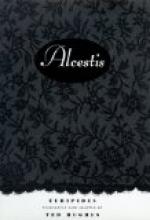As to Admetus’s motive, we must remember that the entertaining of Heracles is a datum of the story in its simplest form. See Preface, pp. xiv, xv. In Euripides, Admetus is perhaps actuated by a mixture of motives, real kindness, pride in his ancestral hospitality, and a little vanity. He likes having the great Son of Zeus for a friend, and he has never yet turned any one from his doors.
Euripides passes no distinct judgment on this act of Admetus. The Leader in the dialogue blames him ("Art thou mad?”) and so does Heracles hereafter, p. 56. But the Chorus glorifies his deed in a very delightful lyric. Perhaps this indicates the judgment we are meant to pass upon it. On the plane of common sense it was doubtless all wrong, but on that of imaginative poetry it was magnificent.
P. 35, 11. 569-605, Chorus.]—Apollo, worshipped as a shepherd god and a singer, harper, piper, etc. ("song-changer"), had been himself a stranger in this “House that loved the stranger”: hence its great reward. Othrys is the end of the mountain range to the south of Pherae; Lake Boibeis was just across the narrow end of the plain to the north-east, beyond it came Mt. Pelion and the steep harbourless coast. Up to the north-west the plain of Thessaly stretched far away towards the Molossian mountains. The wild beasts gathered round Apollo as they did round Orpheus ("There where Orpheus harped of old, And the trees awoke and knew him, And the wild things gathered to him, As he piped amid the broken Glens his music manifold.”—Bacchae, p. 35).
P. 37, l. 614, Scene with Pheres.]—Pheres is in tradition the “eponymous hero” of Pherae, i.e. the mythical person who is supposed to have given his name to the town. It is only in this play that he has any particular character. The scene gives the reader a shock, but is a brilliant piece of satirical comedy, with a good deal of pathos in it, too. The line (691) [Greek: chaireis horon phos, patera d’ ou chairein dokeis]; ("Thou lovest the light, thinkest thou thy father loves it not?”) seems to me one of the most characteristic in Euripides. It has a peculiar mordant beauty in its absolutely simple language, and one cannot measure the intensity of feeling that may be behind it. Pheres shows great power of fight, yet one feels his age and physical weakness. See Preface, p. xvi.
P. 40, l. 713 ff. The quick thrust and parry are sometimes hard to follow in reading, though in acting the sense would be plain enough. Admetus cries angrily, “Oh, live a longer life than Zeus!” “Is that a curse?” says Pheres; “are you cursing because nobody does you any harm?” (i.e. since you clearly have nothing else to curse for). Admetus: “On the contrary I blessed you; I knew you were greedy of life.” Pheres: “I greedy? It is you, I believe, that Alcestis is dying for.”
P. 42, l. 732. Acastus was Alcestis’s brother, son of Pelias.




